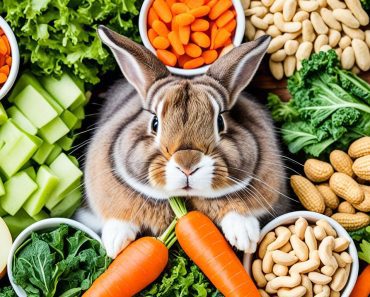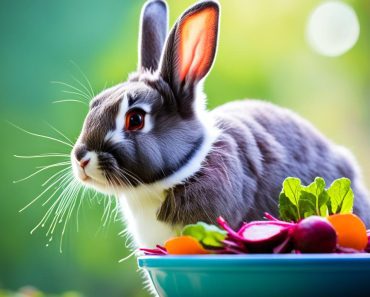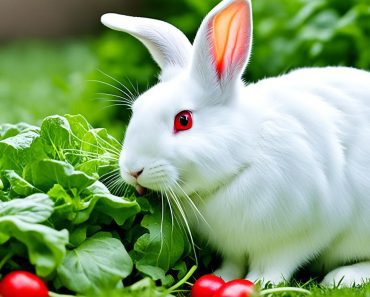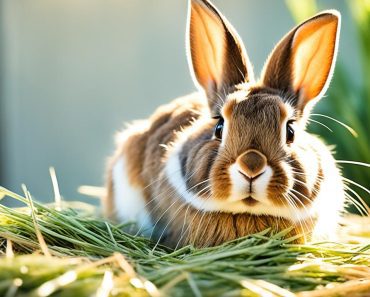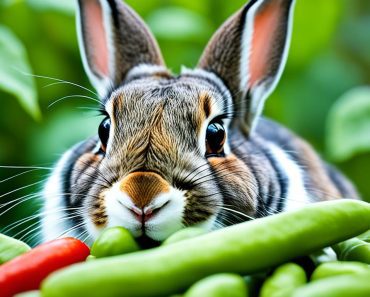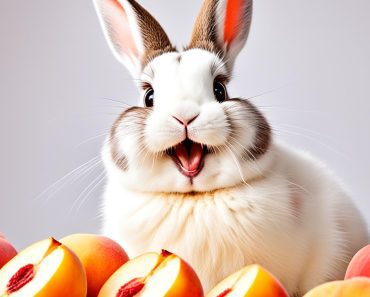As a rabbit owner, you may wonder: can rabbits eat blueberries? Well, I’m here to tell you that yes, rabbits can enjoy these delicious berries in moderation. Blueberries can be a healthful addition to their daily diet, providing both taste and nutrition.
It’s important, however, to practice portion control when feeding rabbits blueberries. These sweet treats contain a high sugar content, so it’s best to offer them sparingly to prevent any health issues. Additionally, ensuring the freshness and proper washing of blueberries is crucial before serving them to your rabbit.
Blueberries offer a range of benefits for rabbits. They provide essential vitamins, antioxidants, fiber, and hydration, contributing to your bunny’s overall well-being. But it’s important to remember that blueberries should only constitute a small portion of your rabbit’s diet. A well-balanced nutrition plan consisting of hay, vegetables, and pellets should always take precedence.
While blueberries are a safe fruit option for rabbits, they are not the only choice available. Other fruits, such as apples, bananas, strawberries, pears, peaches, plums, pineapple, melons, and grapes, can also be given to your rabbit in moderation.
Can Rabbits Eat Blueberries? Yes, they can, occasionally.
- Rabbits can safely eat blueberries in moderation as part of a balanced diet.
- Blueberries provide vitamins, antioxidants, fiber, and hydration for rabbits.
- Practice portion control due to the high sugar content of blueberries.
- Ensure blueberries are fresh and thoroughly washed before feeding them to your rabbit.
- Other safe fruits for rabbits include apples, bananas, strawberries, pears, peaches, plums, pineapple, melons, and grapes.
Remember, a healthy rabbit diet consists of a variety of hay, fresh vegetables, and high-quality pellets. By offering your bunny a balanced nutrition plan and monitoring their digestive health, you can ensure their well-being and happiness.
The Nutritional Benefits of Blueberries for Rabbits
Blueberries offer several nutritional benefits for rabbits. They are a good source of vitamins, particularly vitamin C, which supports the immune system and aids in wound healing. The antioxidants present in blueberries, such as anthocyanins, help protect a rabbit’s cells from damage caused by free radicals.
The fiber content in blueberries promotes healthy digestion in rabbits, helping prevent issues like hairballs and gastrointestinal stasis. Additionally, blueberries have a high water content that contributes to a rabbit’s hydration levels, supporting their overall well-being.
To illustrate the importance of blueberries in a rabbit’s diet, let’s dive deeper into their nutritional values:
- Vitamins: Blueberries provide essential vitamins, including vitamin C, which boosts a rabbit’s immune system and aids in wound healing. This is particularly beneficial for rabbits, as they cannot synthesize their own vitamin C. Including blueberries in their diet helps meet their vitamin C needs.
- Antioxidants: Blueberries contain powerful antioxidants, such as anthocyanins, which protect a rabbit’s cells from oxidative stress caused by free radicals. These antioxidants contribute to the overall health and longevity of rabbits.
- Fiber: The fiber content in blueberries helps maintain a healthy digestive system in rabbits. The dietary fiber promotes regular bowel movements, reduces the risk of hairballs, and prevents gastrointestinal issues like stasis.
- Hydration: Blueberries have a high water content, which helps keep rabbits hydrated. Proper hydration is important for maintaining overall health, ensuring organ function, and improving digestion.
By incorporating blueberries into a rabbit’s diet, you provide them with valuable vitamins, antioxidants, fiber, and hydration. However, it’s important to remember that blueberries should be given in moderation as part of a well-balanced diet. Other dietary components, such as hay, fresh vegetables, and high-quality rabbit pellets, should remain the main focus of their nutrition.
Considerations for Feeding Blueberries to Rabbits
While blueberries can be a nutritious addition to a rabbit’s diet, there are some important considerations to keep in mind. Blueberries have a high sugar content, so they should be given sparingly to avoid obesity and other health problems.
It’s crucial to provide a variety of fruits and vegetables in a rabbit’s diet to ensure they receive a wide range of nutrients. While blueberries are a great source of vitamins and antioxidants, it’s important to remember that a well-balanced diet for rabbits should include other fruits and vegetables as well. This variety will help ensure that your rabbit gets all the necessary nutrients for optimal health.
Monitoring your rabbit’s digestion after introducing blueberries is essential. Some rabbits may have a sensitive digestive system, and blueberries can cause gastrointestinal upset. Watch for any signs of digestive discomfort, such as diarrhea or changes in appetite, and adjust the amount of blueberries accordingly.
When feeding blueberries to your rabbit, it’s important to consider their freshness. Fresh blueberries are firm, vibrant in color, and free from any signs of spoilage. Avoid giving your rabbit blueberries that are overripe, mushy, or moldy, as they can be harmful to their health.
Before offering blueberries to your rabbit, be sure to wash them thoroughly. This will remove any pesticides or contaminants that could be present on the skin. Rinse the blueberries under running water and gently rub them to ensure they are clean.
Finally, it’s worth noting that rabbits should only eat raw foods. Cooked foods can disrupt their delicate digestive system and lead to serious health issues. Stick to offering fresh, raw blueberries to your rabbit as an occasional treat.
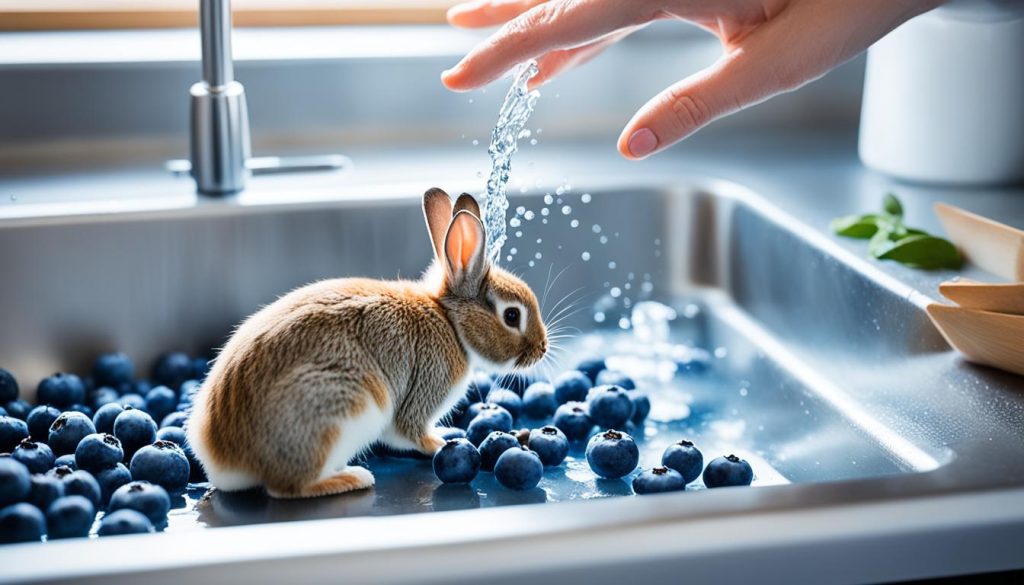
Remember, moderation is key when it comes to feeding blueberries to rabbits. While they can enjoy the occasional blueberry as a tasty and nutritious treat, their main diet should consist of hay, fresh vegetables, and high-quality rabbit pellets. Prioritize your rabbit’s overall well-being by offering a balanced and varied diet that meets their nutritional needs.
How Many Blueberries Can Rabbits Eat?
Rabbits can enjoy blueberries as an occasional treat, but it’s important to practice portion control and ensure a balanced diet. Due to their high sugar content, it is recommended to limit the quantity of blueberries given to your rabbit. The maximum amount of fruit, including blueberries, should be limited to 1-2 tablespoons per day, depending on the size of the rabbit.
A well-balanced diet is crucial for a rabbit’s overall health. Along with occasional treats like blueberries, their diet should primarily consist of hay, fresh vegetables, and high-quality rabbit pellets. These provide the necessary nutrients and fiber for optimal well-being.
It’s important to note that each rabbit may have a different tolerance to blueberries. Monitor your rabbit’s reaction after introducing blueberries into their diet to ensure they tolerate them well. If you have any concerns or questions about your rabbit’s diet, it’s always best to consult with a veterinarian who can provide guidance tailored to your rabbit’s specific needs.
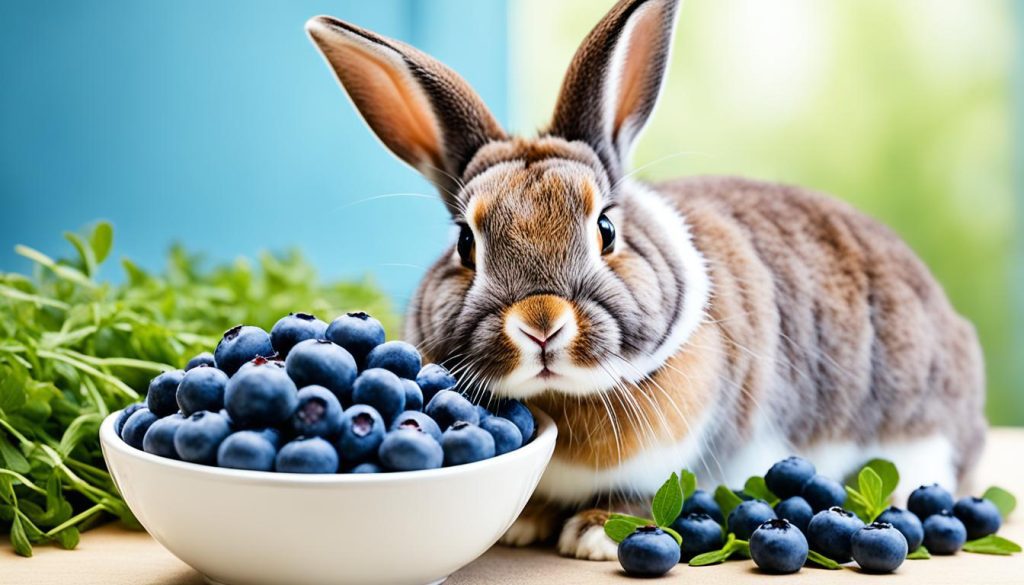
Other Fruits for Rabbits
In addition to blueberries, there are several other safe fruits that rabbits can enjoy as occasional treats:
- Apples
- Bananas
- Strawberries
- Pears
- Peaches
- Plums
- Pineapple
- Melons
- Grapes
These fruits can add a variety of flavors to your rabbit’s diet. However, it’s important to offer them in moderation due to their high sugar content. Fruits should only make up a small portion of a rabbit’s diet, ideally no more than 1-2 tablespoons per day, depending on the rabbit’s size.
Remember that the majority of a healthy rabbit’s diet should consist of hay, fresh leafy green vegetables, and high-quality rabbit pellets. These provide essential nutrients and fiber for their overall well-being.
Apples for Rabbits
Apples are a sweet and crunchy treat that rabbits enjoy. They provide vitamins A and C, as well as fiber. Remember to remove the seeds and core before offering them to your rabbit, as they can be a choking hazard.
Bananas for Rabbits
Bananas are a tasty treat for rabbits. They are rich in potassium and provide natural sugars. However, due to their high sugar content, bananas should only be given occasionally and in small quantities.
Strawberries for Rabbits
Strawberries are a juicy and flavorful treat for rabbits. They are packed with vitamin C, antioxidants, and fiber. Remember to wash them thoroughly before offering them to your rabbit.
Pears for Rabbits
Pears are a refreshing fruit that rabbits can enjoy. They provide vitamins A and C, as well as dietary fiber. Remember to remove the seeds and core, and offer them in moderation due to their high sugar content.
Peaches for Rabbits
Peaches are a delicious summer fruit that rabbits can have as an occasional treat. They provide vitamins A and C, as well as fiber. Offer them in moderation and remove the pit before feeding them to your rabbit.
Plums for Rabbits
Plums are another fruity delight that rabbits can enjoy. They provide vitamins A and C, as well as dietary fiber. Remove the pit and offer them in moderation to avoid excessive sugar intake.
Pineapple for Rabbits
Pineapple can be a sweet and tangy treat for rabbits. It contains vitamin C and bromelain, which aids in digestion. Offer small chunks of fresh pineapple as an occasional treat.
Melons for Rabbits
Melons, such as watermelon, cantaloupe, and honeydew, can be refreshing and hydrating for rabbits. They are rich in vitamins A and C, as well as water content. Remove the seeds and rind, and offer small pieces as an occasional treat.
Grapes for Rabbits
Grapes are a sweet and juicy treat that rabbits can enjoy. They are a good source of vitamins K and C. Remember to offer them in moderation, as grapes contain natural sugars. Remove the seeds before feeding them to your rabbit.
Conclusion
Feeding rabbits blueberries can be a safe and enjoyable addition to their diet. Blueberries offer a range of nutritional benefits, including vitamins, antioxidants, fiber, and hydration. However, it is crucial to exercise portion control and ensure that blueberries are given in moderation as occasional treats. A well-balanced diet for rabbits should primarily consist of hay, fresh vegetables, and high-quality rabbit pellets, with blueberries comprising only a small portion.
While blueberries are safe for rabbits, it is important to monitor their digestion and adjust their diet according to their specific needs. Consulting with a veterinarian can provide guidance on the appropriate quantity and frequency of blueberry consumption for your furry companion. Remember to prioritize a balanced diet to ensure your rabbit’s overall health and well-being.
By incorporating blueberries into your rabbit’s diet in a responsible manner, you can provide them with a tasty and nutritious treat. Just remember that variety, moderation, and balance are key when it comes to feeding blueberries and other fruits to your rabbit. Keep your bunny happy and healthy by offering a well-rounded diet that meets all their nutritional needs.

